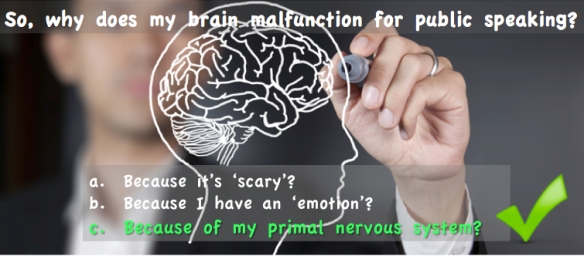Can Anxiety Make It Difficult to Speak?
Yes, anxiety can make it challenging to speak due to symptoms like nervousness, racing thoughts, and increased self-consciousness. These symptoms can interfere with communication, causing difficulty in finding the right words, stammering, or even complete avoidance of speaking situations.
Additionally, anxiety can trigger physical symptoms such as a dry mouth, trembling voice, or rapid heartbeat, further exacerbating the difficulty in speaking. As a result, individuals with anxiety may feel frustrated, embarrassed, or socially isolated. Understanding the connection between anxiety and speaking difficulties can help in seeking appropriate treatment and coping strategies to manage anxiety and improve communication skills.

Credit: www.healthline.com
Understanding The Impact Of Anxiety On Communication Skills
Anxiety can have a significant impact on an individual’s ability to communicate effectively. It can create a barrier that hinders their communication skills. When anxiety flares up, it can make it difficult for someone to express their thoughts and feelings verbally.
They may struggle to find the right words or experience a racing mind that makes it hard to organize their thoughts. Anxiety can also amplify self-consciousness and self-doubt, leading to a fear of being judged or misunderstood. This fear can further impede their ability to communicate with confidence.
Additionally, anxiety may manifest physically, causing symptoms such as trembling or a shaky voice, which can be distracting and make it challenging to speak clearly. Understanding the impact of anxiety on communication skills can help individuals explore strategies to manage their anxiety and improve their ability to express themselves effectively.
Effects Of Anxiety On Speaking Abilities
Anxiety can make speaking difficult due to the physical symptoms that often accompany it. These symptoms, such as a racing heart, trembling hands, and a dry mouth, can interfere with the ability to articulate thoughts clearly. In addition to the physical effects, anxiety can also impact speaking abilities at a psychological level.
Negative self-talk and self-doubt can limit confidence and hinder the flow of words. Moreover, social factors can also play a role in speech anxiety. Fear of judgment or criticism from others can create a barrier to effective communication. Overall, anxiety’s impact on speaking abilities is multi-faceted, with both physical and psychological factors contributing to its difficulties.
It is important to address and manage anxiety in order to improve one’s ability to speak confidently and effectively.
Unraveling The Causes Of Speaking Anxiety
Anxiety can significantly hinder one’s ability to communicate effectively. Understanding the root causes of speaking anxiety is essential. Personal factors play a crucial role in contributing to anxiety during speaking engagements. Experiences and traumas from the past can trigger speech anxiety, making it difficult for individuals to express themselves verbally.
By unraveling the underlying causes of this anxiety, we can better address and manage its effects. Being aware of our personal history and the factors that contribute to speaking anxiety can help us find strategies to overcome this challenge. Through patience, support, and self-reflection, individuals can develop techniques to alleviate their anxiety and regain confidence in their ability to speak effectively.
Generalized Anxiety Disorder (Gad) And Speech Impediments
Anxiety can significantly impact an individual’s ability to speak. Generalized Anxiety Disorder (GAD) can contribute to speech impediments, affecting verbal fluency and clarity. Those with GAD may experience difficulties expressing themselves verbally due to heightened anxiety levels. Moreover, GAD has been linked to the onset or exacerbation of stuttering, further complicating speech.
The relationship between GAD and speech impediments highlights the intricate connection between mental health and communication abilities. Individuals with GAD may find it challenging to articulate their thoughts or engage in conversations, as anxiety can interfere with their speech patterns, causing hesitations or interruptions.
Understanding the impact of GAD on speech can help individuals seek appropriate support and therapy to manage their anxiety and improve their ability to communicate effectively.
Social Anxiety Disorder (Sad) And The Fear Of Speaking In Public
Anxiety can indeed make it challenging to speak, particularly in social situations. Those with Social Anxiety Disorder (SAD) often experience a fear of speaking in public, which further exacerbates their anxiety symptoms. Fear and avoidance of public speaking is a common trait among individuals with SAD.
The underlying shame and embarrassment associated with vocal expression can be overwhelming, leading to a reluctance to participate in conversations, presentations, or any situation that requires speaking in front of others. This fear can be debilitating, impacting various aspects of one’s personal and professional life.
Consequently, individuals with SAD may avoid social interactions altogether, isolating themselves and hindering their personal growth and development. Recognizing and addressing this fear of speaking is crucial in overcoming social anxiety and improving overall well-being.
Panic Disorder And Communication Challenges
Anxiety can present challenges when it comes to speaking, particularly for individuals with panic disorder. Panic attacks can severely disrupt communication, making it difficult to articulate thoughts and express oneself effectively. During an episode, individuals may experience limited vocabulary and struggle to find the right words.
This inhibition can further hinder their ability to communicate, causing frustration and anxiety. The uncontrollable nature of panic attacks adds to the speech difficulties, making it challenging to maintain a coherent flow of conversation. These disruptive effects on speech can impact various aspects of an individual’s life, potentially leading to social isolation and decreased self-esteem.
It is important to recognize that anxiety can manifest in different ways, and seeking support from mental health professionals can be beneficial in managing these difficulties.
Cognitive Techniques For Managing Anxiety When Speaking
Anxiety can greatly hinder one’s ability to speak. To manage this, cognitive techniques can be used. Identifying negative thoughts is crucial, as they can fuel anxiety. Challenging these thoughts by examining their validity and replacing them with positive affirmations can help.
Additionally, reframing anxiety as excitement or anticipation can shift one’s mindset. This can lead to a more confident and relaxed state when speaking. By practicing these techniques, individuals can overcome the difficulties anxiety poses and improve their speaking abilities. It’s important to remember that anxiety is a common experience and with the right strategies, it can be managed successfully.
Breathing And Relaxation Exercises For Speech Anxiety
Anxiety can often hinder our ability to speak and communicate effectively. To combat this, practicing breathing and relaxation exercises can be highly beneficial. Deep breathing techniques help calm nervousness by promoting a state of calmness and reducing anxiety. By focusing on long, deep breaths, we can slow down our heart rate and quiet the mind.
Another effective technique is progressive muscle relaxation, which involves tensing and then releasing different muscle groups in the body. This helps to alleviate tension and promotes a sense of physical and mental relaxation. By incorporating these exercises into our daily routine, we can gradually reduce speech anxiety and improve our ability to speak confidently and coherently.
Communication Skills Training To Boost Confidence
Anxiety can sometimes hinder our ability to speak clearly and confidently. Communication skills training is an effective way to overcome this challenge and boost self-assurance. Public speaking courses and workshops provide individuals with the tools and techniques to improve their public speaking abilities.
These programs offer valuable insights on how to handle anxiety and perform well in front of an audience. Additionally, speech therapy can be beneficial for those experiencing speech disorders caused by anxiety. By focusing on techniques to manage anxiety-induced speech difficulties, individuals can regain their confidence and communicate effectively.
Whether it’s through training or therapy, addressing anxiety-related speech issues can greatly enhance one’s communication skills and overall quality of life. So don’t let anxiety hold you back, seek the necessary support and guidance to overcome these challenges.
Encouraging Empathy And Understanding
Anxiety can often impair a person’s ability to communicate effectively, especially when it comes to speaking. Encouraging empathy and understanding is crucial in creating a safe space for open communication. By fostering an environment where individuals feel comfortable expressing their thoughts and emotions, we can alleviate the anxiety that inhibits their ability to speak.
Enhancing our listening skills is equally important, as it allows us to actively engage with others and show them we genuinely care about what they have to say. By avoiding repetitive terms and using a variety of phrases, we can maintain the reader’s interest and deliver information in an engaging way.
Ultimately, by acknowledging the impact anxiety has on communication and actively working towards improving it, we can create a more inclusive and understanding society.
Addressing Stigma And Raising Awareness
Anxiety can indeed make it challenging to speak, and it is crucial to address the associated stigma and raise awareness. By fighting stereotypes surrounding speech disorders, we can create a more inclusive society. Advocacy and education initiatives play a vital role in supporting individuals with anxiety disorders, providing them with tools and resources to overcome their difficulties.
It is important to acknowledge the impact anxiety can have on communication and to promote understanding and empathy within our communities. Through continuous efforts, we can break down barriers and ensure that individuals affected by anxiety feel supported and empowered to express themselves without fear or judgment.
Together, we can make a difference in the lives of those battling anxiety and help create a more inclusive and compassionate world.
Seeking Professional Help
Anxiety can indeed make it challenging to communicate effectively. However, seeking professional help can make a significant difference. Recognizing the need for assistance in managing mental health issues is crucial. When anxiety-related speech difficulties arise, consulting a mental health professional becomes imperative.
They can provide the necessary support and guidance tailored to individual needs. Different treatment approaches are available for such difficulties. These can include therapy sessions, prescription medications, and learning coping mechanisms. It is essential to remember that no two individuals are the same, so treatment plans may vary.
By addressing the underlying anxiety issues, individuals can regain their confidence and improve their ability to speak without hindrance. Seeking help from a professional can be the first step towards a better and more fulfilling life.
Frequently Asked Questions Of Can Anxiety Make It Difficult To Speak?
Why Does Anxiety Make Me Unable To Speak?
Anxiety can make it difficult to speak due to heightened levels of stress and fear. When you feel anxious, your body goes into “fight or flight” mode, triggering a surge of adrenaline and activating your body’s stress response. This can lead to physical symptoms like a racing heart, rapid breathing, and tense muscles.
Additionally, anxiety can affect cognitive functioning, causing difficulty in organizing thoughts and finding the right words to express yourself. The fear of judgment and the pressure to perform perfectly can also make speaking in front of others daunting and overwhelming.
It is important to remember that anxiety is a common mental health condition and seeking support from a professional can help manage symptoms and improve your ability to communicate effectively.
Why Can’T I Speak Properly All Of A Sudden?
Sudden difficulties in speaking may have various causes. It could be the result of physical factors such as a stroke, muscle weakness, or injuries affecting the speech muscles. Certain medical conditions like Parkinson’s disease, multiple sclerosis, or brain tumors can also affect speech.
Additionally, psychological or emotional factors such as stress, anxiety, or depression can contribute to temporary speech impediments. In some cases, medications, alcohol, or drug abuse may cause speech difficulties. If you’re experiencing sudden speech problems, it’s crucial to consult a healthcare professional for an accurate diagnosis and appropriate treatment.
They will be able to assess your specific condition and provide the necessary support to help you regain your ability to speak properly.
What Kind Of Anxiety Doesn’T Let You Talk?
Social anxiety disorder, also known as social phobia, is the type of anxiety that can make it difficult for individuals to talk. This anxiety disorder stems from a fear of being judged or embarrassed in social situations. People with social anxiety may experience intense fear and worry about social interactions, leading to avoidance of situations where they may be required to speak, such as public speaking or social gatherings.
This anxiety can cause a range of physical symptoms like sweating, trembling, rapid heartbeat, and difficulty breathing. These symptoms can further exacerbate the fear and make it even harder to communicate verbally. However, it is important to note that anxiety affects individuals differently, and some may experience difficulty talking in other anxiety disorders as well.
Seeking professional help, such as therapy or medication, can provide effective strategies for managing social anxiety and improving communication skills.
Can Anxiety Cause Lack Of Communication?
Anxiety can indeed cause a lack of communication. When feeling anxious, people may experience difficulty expressing their thoughts and feelings, leading to a diminished ability to communicate effectively. Anxiety can manifest as social anxiety disorder, making individuals excessively self-conscious and fearful of being judged or humiliated in social situations.
This fear can prevent them from engaging in conversations or actively participating in discussions. Additionally, anxiety can also trigger physical symptoms such as racing heart, trembling, or sweating, which further impede communication. It is essential to seek support and treatment if anxiety is interfering with your ability to communicate as effective communication is crucial for maintaining healthy relationships and overall well-being.
Conclusion
Dealing with anxiety can indeed make it difficult to speak. This psychological condition can manifest in various ways, such as stuttering, stumbling over words, or even completely avoiding speaking situations. Those who struggle with anxiety may experience a range of symptoms, from a rapid heartbeat to a heightened sense of self-consciousness.
Fortunately, there are coping mechanisms available, such as therapy, medication, or self-help techniques, that can alleviate the effects of anxiety and provide individuals with the tools to manage their speaking difficulties. Additionally, it is crucial for society to cultivate a compassionate and understanding environment where individuals with anxiety are supported and encouraged to express themselves without judgment or criticism.
By acknowledging and addressing the impact of anxiety on speech, we can help create a world in which everyone feels comfortable and empowered to communicate.




